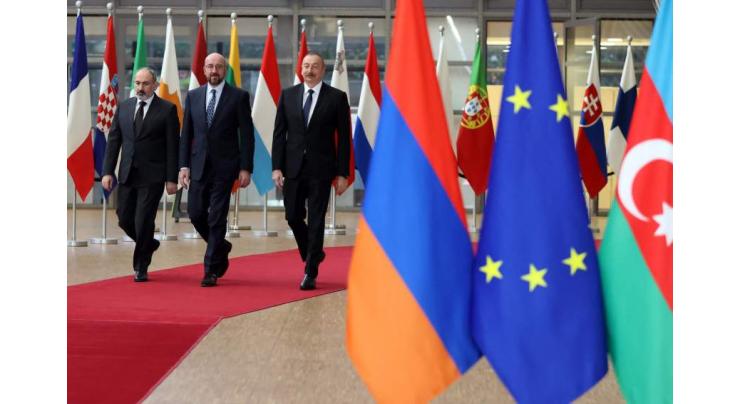
- Home
- World
- News
- Russia-Armenia-Azerbaijan Agreements Remain Key to Nagorno-Karabakh Settlement - Lavrov
Russia-Armenia-Azerbaijan Agreements Remain Key To Nagorno-Karabakh Settlement - Lavrov
Faizan Hashmi Published March 20, 2023 | 06:35 PM

Russia has no doubt that trilateral agreements with Armenia and Azerbaijan remain key for the settlement of the situation in Nagorno-Karabakh, a breakaway region that proclaimed its independence from Baku in 1991, Russian Foreign Minister Sergey Lavrov said on Monday
MOSCOW (UrduPoint News / Sputnik - 20th March, 2023) Russia has no doubt that trilateral agreements with Armenia and Azerbaijan remain key for the settlement of the situation in Nagorno-Karabakh, a breakaway region that proclaimed its independence from Baku in 1991, Russian Foreign Minister Sergey Lavrov said on Monday.
"We have no doubt that the trilateral statements of Armenian, Azerbaijani and Russian leaders remain the key for the implementation of all decisions to ensure the stabilization of the situation. In the economic, military-political and international legal spheres," Lavrov said during a meeting with Armenian Foreign Minister Ararat Mirzoyan.
The decades-long conflict between Armenia and Azerbaijan over Nagorno-Karabakh flared up again in September 2020, marking the worst escalation since the 1990s. Hostilities ended with a Russia-brokered trilateral declaration of ceasefire signed in November 2020.
The two former Soviet countries agreed to the deployment of Russian peacekeepers in the region. Occasional clashes have since occurred on the border.
Since December 2022, the Lachin Corridor � a road which runs through Azerbaijani territory and serves as the only link between Armenia and Nagorno-Karabakh � has been blocked by a group of people from Azerbaijan described by Baku as environmental activists protesting alleged illegal Armenian mining in the area.
The United Nations' main judicial body ruled in February that Azerbaijan must ensure unimpeded movement along the Lachin Corridor. Armenia argued in the court filing that the activists were acting on Baku's command and demanded that it "cease its orchestration and support" of the blockade.
Related Topics
Recent Stories

Robinson, bowlers help New Zealand go 2-1 up against Pakistan

Shahzeb Chachar to hold khuli kachehri on April 26

Heatwave amid Israel's aggression in Gaza brings new misery, disease risk

Tourism must change, mayor says as Venice launches entry fee

Court adjourns Judicial Complex attack case till May 17

Nasreen Noori’s book ‘Popatan Jahra Khwab’ launched

Wafaqi Mohtasib inspection team visits Excise and taxation office

AJLAC announces 5th Conference titled ‘People’s Mandate: Safeguarding Civil ..

Pak-US officials engage to enhance trade, investment ties

IBCC to promote educational excellence, expand regional presence

Pakistani 'Blue Helmets' serving UN Peacekeeping Mission in DR Congo set to leav ..

Putin says plans to visit China in May
More Stories From World
-
Slot 'confident' of Liverpool job as 'negotiations' take place
49 minutes ago -
Google parent Alphabet's Q1 profits beat estimates: company
59 minutes ago -
WADA asks 'independent prosecutor' to examine Chinese swimmers case
1 hour ago -
New York court overturns Harvey Weinstein sex crime conviction
1 hour ago -
Bagnaia and Spanish rivals chase victory at Jerez
3 hours ago -
Russian, Ukrainian strikes kill at least 10 in frontline regions
3 hours ago
-

Heatwave amid Israel's aggression in Gaza brings new misery, disease risk
3 hours ago -

Tourism must change, mayor says as Venice launches entry fee
3 hours ago -

Pakistani 'Blue Helmets' serving UN Peacekeeping Mission in DR Congo set to leave after 20 years of ..
4 hours ago -

Putin says plans to visit China in May
4 hours ago -

US reinstates open internet rules rescinded under Trump
4 hours ago -

Honda announces US$11 bn EV battery and vehicle plant in Canada
4 hours ago





